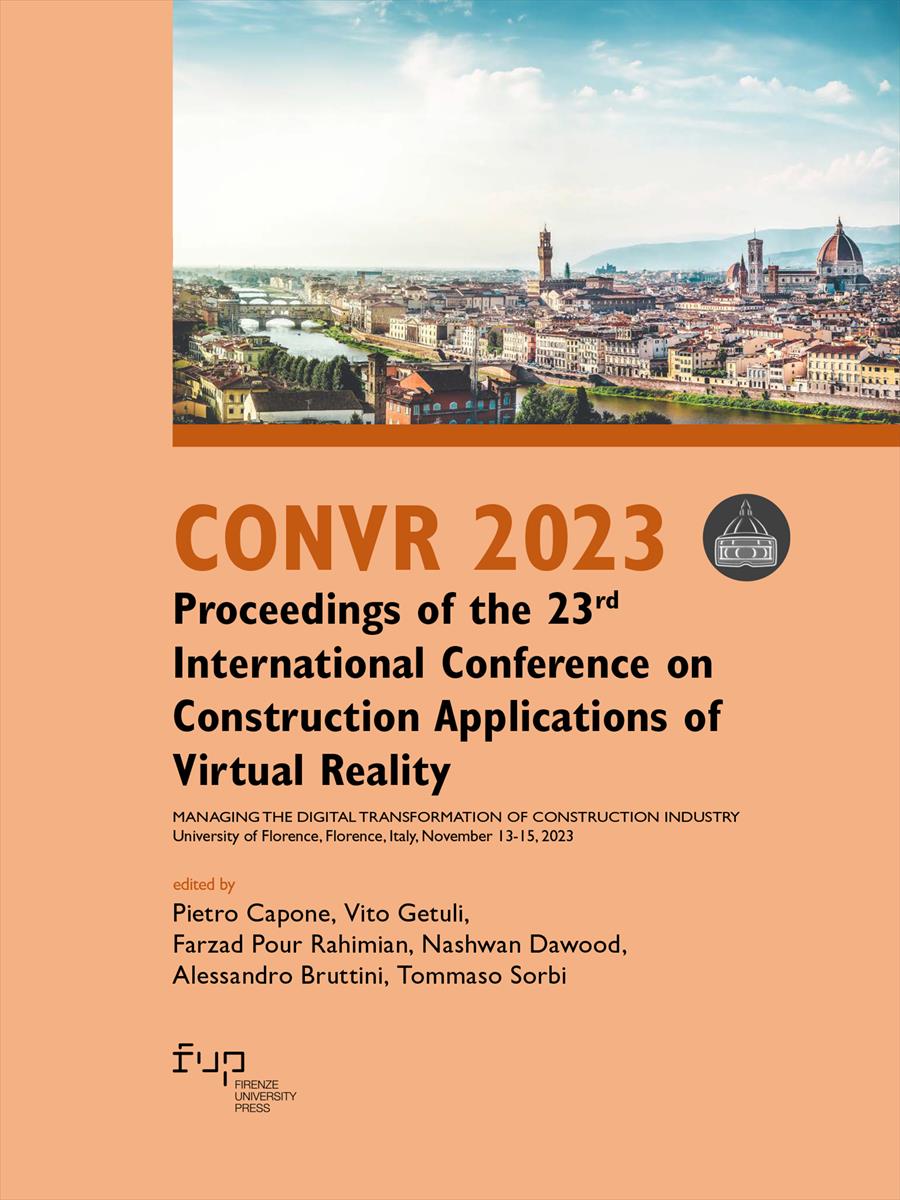- CONVR 2023 - Proceedings of the 23rd International Conference on Construction Applications of Virtual Reality
- Edited by Pietro Capone, Vito Getuli, Farzad Pour Rahimian, Nashwan Dawood, Alessandro Bruttini, Tommaso Sorbi
A Preliminary Investigation of Knowledge Management Tools for the Construction Sector
- Bartu Kologlu
- Deniz Artan
- © 2023 Author(s) |
- CC BY-NC 4.0
- DOI: 10.36253/979-12-215-0289-3.48
Knowledge management (KM) is used by construction firms to establish organizational memory (OM) and consequently improve their performance by learning from past mistakes and best practices. Knowledge is the input to innovation; thus, the industry must adopt better ways of managing knowledge for advancement in the construction processes. Knowledge management consists of locating, modifying, and sharing knowledge to meet the needs of the current fast-paced sector. Various tools have been developed to support KM and OM in construction companies, however, it is very important to adequately address the needs of the sector for successful implementations. The aim of this study is to analyze the existing KM tools and evaluate their compatibility with the necessities of today’s sector. First, knowledge types in the construction industry were outlined, and existing KM tools were evaluated. Then, expert interviews were performed with two representatives from a prominent construction and a prominent consulting firm to delineate the contemporaneous KM practices as well as the KM needs in the construction industry. Finally, current practice in KM in the construction sector is evaluated, and a vision is developed for a more effective KM approach that could support OM in construction firms
- Keywords:
- Knowledge Management,
- Organizational Memory,
- Construction Firms,
- Software Tools,
Istanbul Technical University, Turkey
Istanbul Technical University, Turkey - ORCID: 0000-0003-4614-3245
- Al-Ghassani, A. M., Anumba, C. J., Carrillo, P. M., & Robinson, H. S. (2005). Tools and Techniques for Knowledge Management. In C. J. Anumba, C. Egbu, & P. Carrillo (Eds.), Knowledge Management in Construction (pp. 10–30). London, UK: Blackwell Publishing.
- Brown, J. S., & Duguid, P. (1991). Organizational learning and communities-of-practice: Toward a unified view of working, learning, and innovation. Organization Science, 2(1), 40–57. DOI: 10.1287/orsc.2.1.40
- Brown, J. S., & Duguid, P. (1998). Organizing Knowledge. California Management Review, 40(3), 90–111. DOI: 10.2307/41165945
- Brown, J. S., & Duguid, P. (2000). The Social Life of Information. Boston, MA: Harvard Business School Press.
- Coakes, E. (2006). Storing and sharing knowledge: Supporting the management of knowledge made explicit in transnational organisations. The Learning Organization, 13(6), 579–593.
- Easterby-Smith, M., & Lyles, A. M. (2012). The Evolving Field of Organisational Learning and Knowledge Management. In M. Easterby-Smith, & A. M. Lyles (Eds.), Handbook of Organisational Learning and Knowledge Management (pp. 1–20). New York, NY: J. Wiley & Sons.
- Egbu, O. C., & Robinson, S. H. (2005). Construction as a Knowledge-Based Industry. In C. J. Anumba, C. Egbu, & P. Carrillo (Eds.), Knowledge Management in Construction (pp. 31–49). London, UK: Blackwell Publishing.
- Ferrada, X., Núñez, D., Neyem, A., Serpell, A., & Sepúlveda, M. (2016). A lessons-learned system for construction project management: A preliminary application. Procedia - Social and Behavioral Sciences, 226, 302–309. DOI: 10.1016/j.sbspro.2016.06.192
- Gualtieri, M. (2016). Hadoop is data’s darling for a reason. Forrester. Available at https://go.forrester.com/blogs/hadoop-is-datas-darling-for-a-reason/
- Holste, J.S., & Fields, D. (2010). Trust and tacit knowledge sharing and use. Journal of Knowledge Management, 14(1), 128–140. DOI: 10.1108/13673271011015615
- Howells, J. (1996). Tacit knowledge, innovation and technology transfer. Technology Analysis and Strategic Management, 8(2), 91-106
- Jarrahi, M.H., Askay, D., Eshraghi, A., & Smith, P. (2022). Artificial intelligence and knowledge management: A partnership between human and AI. Business Horizons 66(1), 87–99
- Lyles, M. A., & Schwenk, C. (1992). Top management, strategy and organizational knowledge structure, Journal of Management Studies, 29(2), 155-74.
- Markus, L. M. (2001). Toward a Theory of Knowledge Reuse: Types of Knowledge Reuse Situations and Factors in Reuse Success. Journal of Management Information Systems, 18(1), 57-93. DOI: 10.1080/07421222.2001.11045671
- Nonaka, I., & Takeuchi, H. (1995). The knowledge-creating company: How Japanese companies create the dynamics of innovation. Oxford University Press.
- Ozorhon, B., Dikmen, I., & Birgonul, M.T. (2005) . A case-based reasoning model as an organizational learning tool, Paper presented at CIB 2005 Helsinki Joint Symposium, Helsinki, Finland. Retrieved from https://www.irbnet.de/daten/iconda/CIB6822.pdf
- Polanyi, M. (1966). Human knowledge. Chicago, IL: The University of Chicago Press.
- Quintas, P. (2005). The Nature and Dimensions of Knowledge Management. In C. J. Anumba, C. Egbu, & P. Carrillo (Eds.), Knowledge Management in Construction (pp. 10–30). London, UK: Blackwell Publishing.
- Rezgui, Y., & Miles, J. (2011). Harvesting and Managing Knowledge in Construction. New York, NY: Spon Press.
- Stein, E. W., & Zwass, V. (1995). Actualizing Organizational Memory with Information Systems. Information Systems Research, 6(2), 85–117. Retrieved from http://www.jstor.org/stable/23011005
- Subramaniam, M., & Youndt, M. A. (2005). The Influence of Intellectual Capital on the Types of Innovative Capabilities. The Academy of Management Journal, 48(3), 450–463.
- Wang, Z., & Wang, N. (2012). Knowledge sharing, innovation and firm performance. Expert Systems with Applications, 39(10), 8899–8908.
- Zhang, J., Zhao, W., Xie, G., & Chen, H. (2011). Ontology-Based Knowledge Management System and Application, Procedia Engineering, 1021–1029.
Chapter Information
Chapter Title
A Preliminary Investigation of Knowledge Management Tools for the Construction Sector
Authors
Bartu Kologlu, Deniz Artan
DOI
10.36253/979-12-215-0289-3.48
Peer Reviewed
Publication Year
2023
Copyright Information
© 2023 Author(s)
Content License
Metadata License
Bibliographic Information
Book Title
CONVR 2023 - Proceedings of the 23rd International Conference on Construction Applications of Virtual Reality
Book Subtitle
Managing the Digital Transformation of Construction Industry
Editors
Pietro Capone, Vito Getuli, Farzad Pour Rahimian, Nashwan Dawood, Alessandro Bruttini, Tommaso Sorbi
Peer Reviewed
Publication Year
2023
Copyright Information
© 2023 Author(s)
Content License
Metadata License
Publisher Name
Firenze University Press
DOI
10.36253/979-12-215-0289-3
eISBN (pdf)
979-12-215-0289-3
eISBN (xml)
979-12-215-0257-2
Series Title
Proceedings e report
Series ISSN
2704-601X
Series E-ISSN
2704-5846
